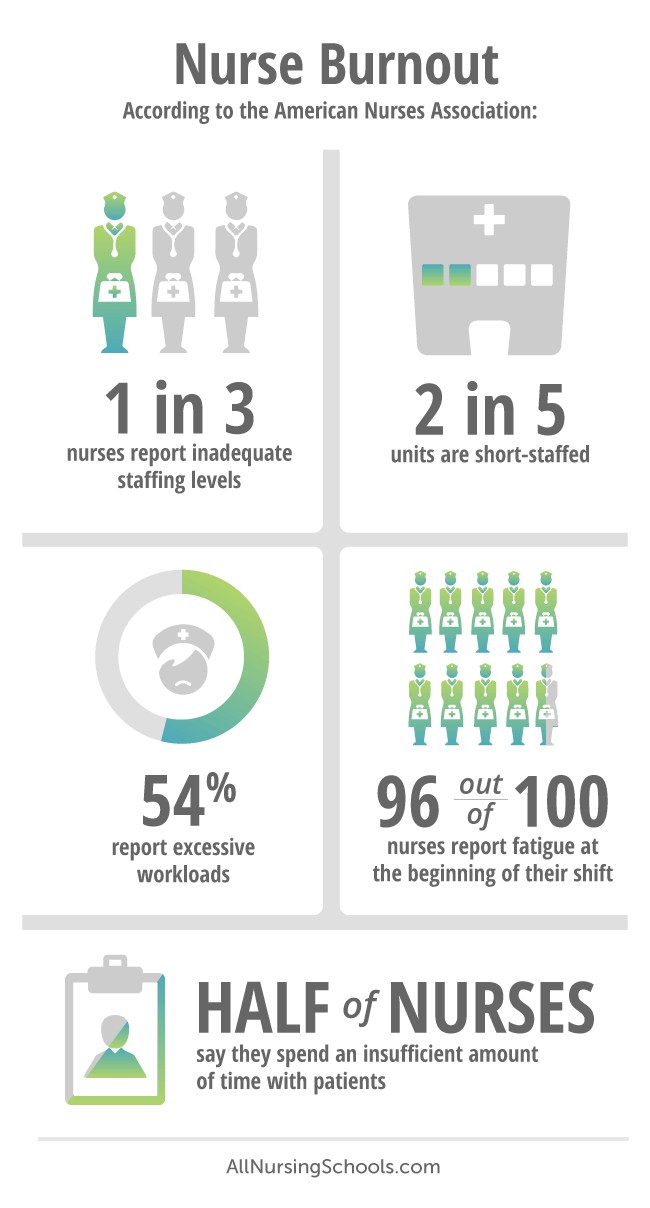Advancing your education can protect from nurse burnout
Nurse burnout can happen to any nurse. Here’s how a degree can help you avoid the problem.
All Nursing Schools Staff


From doctors to patients, many people rely on nurses every day and night. While the job can be immensely rewarding, it can also be taxing. When nurses are frustrated, overworked or unsupported, this can be felt by both a medical institution’s staff and patients. As more people enter the health care system and the nursing shortage continues, it’s not uncommon for nurse burnout to occur (although it’s not a new concept).
Here’s a look at how nurses can prevent or remedy this problem.
How Nurse Burnout Can Happen
Nursing burnout, which usually happens gradually, doesn’t discriminate; it can happen to a new or seasoned nurse at any point in their career.
In many cases, nurse-to-patient ratio is a leading cause. According to the American Nurses Association:

Nurse burnout, according to American Nurse Association: 1 in 3 nurses report inadequate staffing levels, 2 in 5 units are shorts-staffed, 54% report excessive workloads, 96 out of 100 nurses report fatigue at the beginning of their shift, half of nurses say they spend an insufficient amount of time with patients.
In these conditions, there is less time for patient/nurse education. In addition, patients can feel neglected and nurses feel they can’t provide enough quality care or participate in a team approach. Negativity breeds, tasks feel stagnant and daily satisfaction decreases.
Although some hospitals and other medical facilities work to keep nurse-to-patient ratios low, certain occurrences are unavoidable sometimes. Patient acuity—a determination of nurse staffing needs—changes or nurses may call out of work for family reasons or illness. These factors can make it difficult for an institution to accurately staff a shift, yet still leaves nurses overworked and stressed.
Combating Nurse Burnout with Relaxation Techniques

A nurse’s work environment won’t change, but fortunately, there are ways to manage stress in the workplace. In May 2015, a Science Daily released findings that nurses cut their stress by 40% using mindfulness techniques.
Over the course of eight weeks, a group of nurses in a surgical intensive care unit participated in mindfulness exercises, yoga, meditation, music, and gentle stretching and saw significant improvement in their stress levels.
If you’re suffering from high levels of stress at work, consider implementing these methods into your day.
Nurse Burnout and Education
Education, both inside and outside the hospital, can play a key role in addressing burnout. However, as more medical facilities focus on lowering their ratios, educating nurses is often one of the first things to be pushed aside.
Experienced nurses also have another challenge. They become fatigued doing both their own job and training news nurses on a regular basis.
In school, you’ll find that delegation is a hot topic (the NCLEX-RN even has questions about it). Students are taught the importance of communicating clearly, but trust issues can hinder delegation in a real-life setting. Employers expect new nurses to hit the ground running, yet many new graduates are unclear about delegation guidelines in their workplace.
Staying up-to-date on nursing technology can also help decrease the risk for burnout. In some cases, older nurses with decades of knowledge and experience retire because the stress of using new computer charting systems is too much. This means the health care system often loses quality caregivers.
Some nurses say that if a medical facility is willing to provide the education needed to help nurses, both new and experienced, burnout could decrease.
Nursing Burnout or Compassion Fatigue?

Nurses can experience one or the other, or both. While nurse burnout is typically associated with the work environment, compassion fatigue tends to occur when a nurse doesn’t take care of their mental, physical and emotional well-being.
Compassion fatigue causes a nurse to become apathetic and tends to occur among nurses who commonly see death or chronic illnesses. There are steps a nurse can take to battle compassion fatigue—exercise, maintaining a healthy diet and connecting with friends—which help many happily continue in their career. However, if burnout is left to fester too long, it’s not uncommon for a nurse to leave the field altogether.
Earning an Advanced Nursing Degree
Nurses often look to school as a way to avoid burnout. Many thrive knowing they’re working toward a larger accomplishment. And, with so many online degree options, nurses can earn a degree while working.
Since burnout and compassion fatigue can occur when a nurse feels disconnected, many RNs return to school to study a specialty they’re passionate about. With a specialized degree, nurses may find more job opportunities in a setting they’re happier in. A specialized nursing career can also mean a better work schedule and increased salary in some cases.
Examples of nurse specializations:
An advanced degree in nursing can help take you out of the frenetic environment of a hospital or large medical facility. RNs who go on to become nurse practitioners often open a private practice while nurse educators can be found in the classroom. Nurse administration roles put you behind the scenes where you’ll manage nursing personnel and oversee budgets and staffing. In fact, you could be responsible for ensuring your nurses don’t suffer from burnout.
Avoiding Burnout: A Nurse’s Advice
An RN with more than a decade of experience offers this advice and encouragement to nurses:
- Shadow lots of nurses in different departments and at different hospitals
- Look at hospitals that provide education and try to maintain a ratio
- Connect with coworkers; you’ll share many great experiences together
- Focus on eating right, exercising and getting support
Remember, after your first year or two of nursing you can always try another unit or floor in the hospital.
Nursing and Self-Care
You spend all day taking care of others as a nurse, but what about yourself? By performing basic self-care tasks, you’ll feel better, have more energy and avoid burn out.
Eating Right
A 12-hour shift is a long time if you’re not eating right, or not eating at all. The good news is you don’t have to familiarize yourself with vending machine options. Many hospitals across the country have implemented wellness programs and revamped their cafeteria food options.

Although the primary goal for many facilities is to improve patient satisfaction, hospital staff can also benefit from the changes. Instead of processed meals, hospital foodservice companies are introducing more whole grains (quinoa burgers, anyone?) into their meals and utilizing an abundance of fresh vegetables and fruit.
After the Cleveland Clinic began offering healthier options, many staff members started losing weight. Sugary beverages were eliminated and fryers were replaced with ovens. Cooks now chop more fresh vegetables instead of opening canned goods. Meanwhile, New York City runs the “Healthy Hospital Food Initiative” which includes guidelines on ways hospitals can improve the nutritional content of their food.
If you don’t work in a medical facility with healthy options, you can pack easy-to-transport snacks and meals. Here are a few ideas:
- Almonds
- Easy-to-carry fruits (apples, peaches, oranges, and plums)
- Hummus and cut vegetables
- Plain yogurt mixed with raw nuts or fresh fruit
- Sandwiches with lean meats, like turkey or chicken
Feeling fatigued? Nurses often rely on coffee for a caffeine boost, but go easy. Too much coffee can cause jittery feelings and a subsequent crash. Tiredness can also be caused by dehydration. Be sure you’re drinking plenty of water throughout your shift. Non-caffeinated herbal teas are another great option.
Exercise
Running around caring for patients will burn calories, but nurses need more than that to stay well. Taking a few minutes to complete a few purposeful exercises not only revs up the metabolism, but has a mind-clearing and stress-reducing effect.

- Squats: Stand up straight with legs hip-width apart. Squat down as if you’re almost sitting in a chair and hold the position for 10 seconds. Be sure you’re not leaning forward, which can strain your knees. Return to standing position and repeat.
- Take the stairs: Get a short cardio boost by climbing a few flights of stairs.
- Shoulder shrugs: Keep a set of 2- or 5-lb weights in your desk or cabinet to perform these exercises. With weights in hand, slowly lift your shoulders and slowly lower back down.
Incorporating these tips into your daily nursing routine will help keep you alert, focused and ready to care for others.




